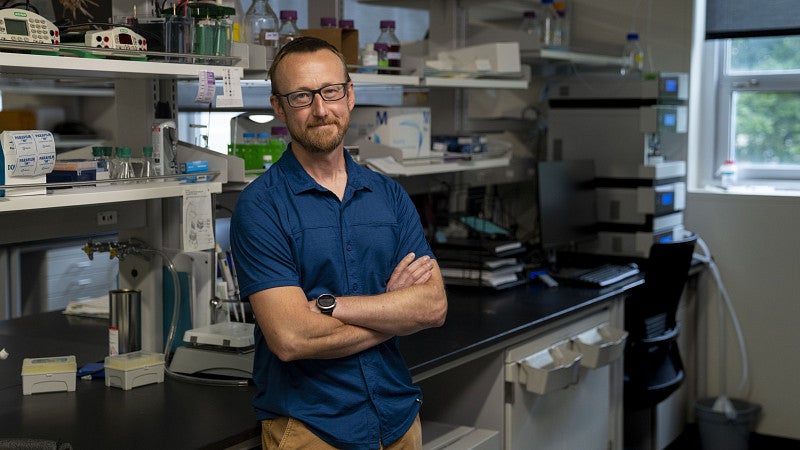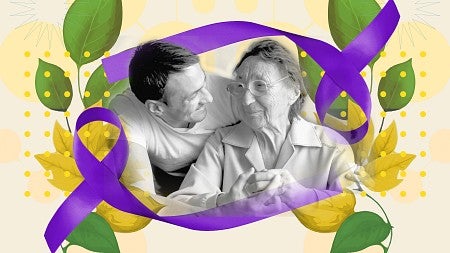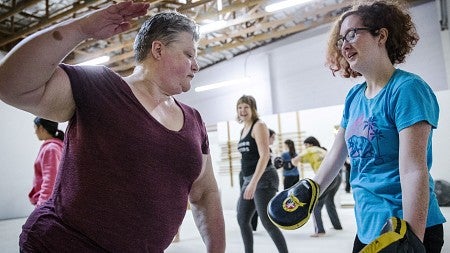
Damien Callahan Seeks Better Recoveries for Athletes
Knight Campus scientist studies elite athletes for clues about muscle rehabilitation after injury
By Matt Cooper • Photo by Chris Larsen • July 6, 2022
2 min readDamien Callahan has long studied how to help older adults bounce back from knee replacement and other orthopedic injuries that can be crippling, even life-threatening.
Now he’s seeking insights from a group that might seem unrelated: elite athletes.
Callahan, an assistant professor in the Human Physiology Department, studies how muscle plasticity influences rehabilitation after injury. Currently, he’s examining the role of cellular muscle proteins in soft-tissue injuries in female athletes. Women are at five to seven times greater risk of muscle and ligament tears.
In the lab, Callahan’s research team runs women and men through demanding knee-extension exercises, to exhaustion. Immediately after, the researchers collect muscle tissue samples through a needle muscle-biopsy technique and isolate individual muscle fibers—roughly the width of a human hair—under a microscope. Stress tests measure the power in each fiber and the mechanical stiffness of the tissue, yielding insights in comparisons of male and female samples and fibers from muscles that are fatigued or at rest.
Though the structure of muscle cells is the same in females and males, there are subtle yet important differences in the proteins that make up these cells. That could account for differences between the sexes in injuries like ACL tears, Callahan says, and a better understanding of those differences could yield new methods to prevent tissue injury—not just in athletes, he adds,but in anyone.
“We can understand things about the molecular mechanisms in athletes,” Callahan says, “that will inform what we want to learn in older adults.”
Callahan’s work is supported by the Wu Tsai Human Performance Alliance, a global research effort that includes the University of Oregon and five other founding institutions. The alliance uses science to promote peak performance for athletes and wellness for everyone. The UO’s efforts are based in the Phil and Penny Knight Campus for Accelerating Scientific Impact.
Out with scar tissue, in with muscle
In another project, Callahan and Karina Nakayama, an assistant professor in the Department of Biomedical Engineering at Oregon Health & Science University, are pursuing regenerative techniques to improve how cells recover from trauma.
“Consider a gunshot wound,” Callahan says. “The body loses significant muscle, which comes back as scar tissue. We’re looking at proteins in these cells and how remaining muscle cells have changed, and the potential for developing a cellular ‘scaffolding’ to support the regeneration of muscle tissue instead of scar tissue.”
Have bike, will travel
Callahan is no stranger to athletic performance—he was formerly a competitive amateur cyclist, challenging the pros in fifty- and sixty-mile road races.
As a doctoral candidate at the University of Massachusetts Amherst, he regularly made the one hundred-mile trip between Amherst and upstate New York by bike, to see his family. While an undergraduate at Boston University, he also made the roughly two hundred-mile trip on a few occasions. Says Callahan: “That was my once-annual, see-if-I-can-still-do-it ride.”
Three on three
These days Callahan runs—after a morning in the lab, or after his kids. He and Audrey, his wife, have four under age seven, including three-year-old triplet girls. Fortunately, Callahan’s son is freeing mom and dad up by taking on more tasks like making breakfast and lunch independently—and providing a third pair of eyes.
“He’s an amazing big brother,” Callahan says. “He watches after his little sisters like a hawk.”
Damien Callahan’s research is part of the Sport and Wellness strategic priority, one of five designed by the Office of the Provost to reshape research and education at the university by looking at societal challenges in the real world and applying a cross-disciplinary approach. Sport and Wellness seeks to answer the question of not just how to live longer, but how to live better, quality lives, by building integrative programs in human physiology, prevention science, community well-being, and more. For more about the work of Damien Callahan and his colleagues, see Optimizing Human Performance.
Matt Cooper is managing editor for Oregon Quarterly.




